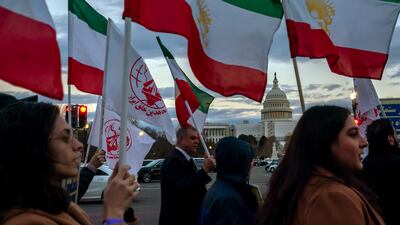Iran has said the arrests of citizens linked to the UK reflects the country’s “destructive role” in recent protests.
Seven people, including some with dual nationality, were arrested in Iran on Sunday over anti-government protests during the past three months, the Islamic Revolutionary Guard Corps said.
Iran has accused western countries, Israel and Saudi Arabia of fomenting the unrest.
Foreign Ministry spokesman Nasser Kanaani said: “Some countries … had an unconstructive role regarding the recent developments in Iran. Their role was totally destructive and incited the riots.”
The British Foreign Ministry said it was seeking further information from Iranian authorities on the reports that British-Iranian dual nationals had been arrested.
“Seven main leaders of the recent protests related to the UK were detained by intelligence services of the IRGC, including dual nationals who were trying to leave the country,” Iranian state media reported.
Mr Kanaani said that “during the recent riots, several citizens of European countries have been arrested with varying degrees of involvement in the riots”.
“Consular and political information has been given to their respective countries,” he said.
“The role of the citizens of a certain number of countries, especially European and western European countries … is quite clear and proved.”
Western countries have accused Iran of “hostage diplomacy” by holding their citizens on false charges in an attempt to gain concessions on issues such as money frozen by sanctions.
Alicia Kearns, a British Conservative MP and chairwoman of the foreign affairs select committee, told BBC radio's World at One programme that the arrests were part of Iran’s plan to blame the protests on foreign entities.
“This is an industrialised taking of state hostages,” she said. “This is what Iran now does and it’s quite interesting the fact that they’ve used the word ‘British links’.
“They key word there is links because although they’ve said there are some dual nationals the reason why they’re saying all seven people have links to Britain is they’re trying to blame the protests on so-called foreign enemies, claiming that we in the West and particularly the UK have orchestrated the protests and this is core to their narrative.
“They will not ever admit that this is a result of a brutal, corrupt and repressive regime.”

Ms Kearns said “my concern is very grave” for UK-Iranian citizens in Iran because the authorities will “happily arrest” dual nationals.
She suggested that some of the British citizens detained in Iran were pounced on by authorities while they were trying to leave the country.
She said advice for British-Iranians in Iran ultimately lay with the Foreign and Commonwealth Office in London. But she said if she were a dual national in Iran she would “absolutely be leaving”.
She said Iranian authorities were willing to use dual nationals “in any game of chess they can and they will face brutal repression”.
Tehran does not recognise dual nationality held by Iranian citizens.
Ms Kearns said as the regime had grown more desperate to stamp out protests, it had resorted more and more to the death penalty for those who take to the streets calling for an end to oppression.
She said Britain had a responsibility to announce new sanctions for every protester’s life taken in such a way.
In Brussels, about 50 protesters braved the rain as they demanded the immediate release of a Belgian aid worker held by Iran.
The protesters held up pictures of Olivier Vandecasteele during the demonstration in the centre of Belgium's capital.
It is “the first year that Olivier is marking Christmas as a hostage in Iran”, said Olivier van Steirtegem, a spokesman for the campaign to free Mr Vandecasteele.
He said the situation was “unthinkable for his family,” who did not even know where he was being held in Iran.
Mr Vandecasteele, 41, was arrested in February and has been held in conditions that Belgium has described as “inhumane”.
Last week, Iran sentenced him to 28 years in jail, stirring an already bitter debate over a stymied prisoner exchange treaty.
The Belgian government subsequently urged all Belgians in Iran, including those with dual citizenship, to leave the country over the risk that they could be arbitrarily arrested and jailed.
Belgium insists Mr Vandecasteele is innocent and is being held as a hostage as Tehran attempts to force Brussels to release an Iranian agent convicted of terrorism.
Under a treaty Belgium and Iran signed earlier this year, Mr Vandecasteele would have been eligible to be swapped for the Iranian, Assadollah Assadi.
Mr Assadi, an Iranian diplomat who was stationed in Austria, was arrested in 2018 after German, French and Belgian law enforcement officials foiled a plot to set off a bomb at a rally outside Paris by an Iranian exiled opposition group.
After three years in detention, he was sentenced to 20 years in prison for terrorism.
But in early December, Belgium's constitutional court suspended the prisoner swap treaty pending a final ruling on its legality within the next three months.
Mr van Steirtegem said the Belgian government believed the stalled treaty was “the only path” to getting Mr Vandecasteele freed.
“The question is whether we can accept leaving a Belgian man to potentially die in an Iranian jail,” he said.
“All that because we don't want to transfer a prisoner from here who has already served five years in prison.”
Protests broke out across Iran on September 16 after the arrest and death of a Kurdish-Iranian woman, Mahsa Amini, 22, in police custody. She was detained for not abiding by the country's dress code.
The protests, in which demonstrators from all walks of life have called for the fall of Iran's ruling theocracy, has posed one of the biggest challenges to the regime since the 1979 revolution.
The government has blamed the unrest on demonstrators bent on destruction of public property and says they are trained and armed by “enemies” such as the US, Israel and Saudi Arabia.

